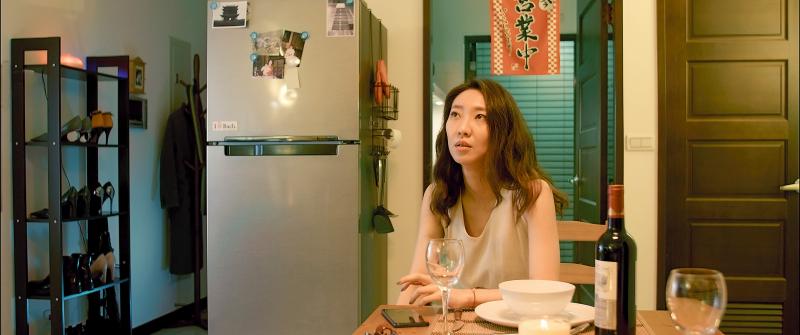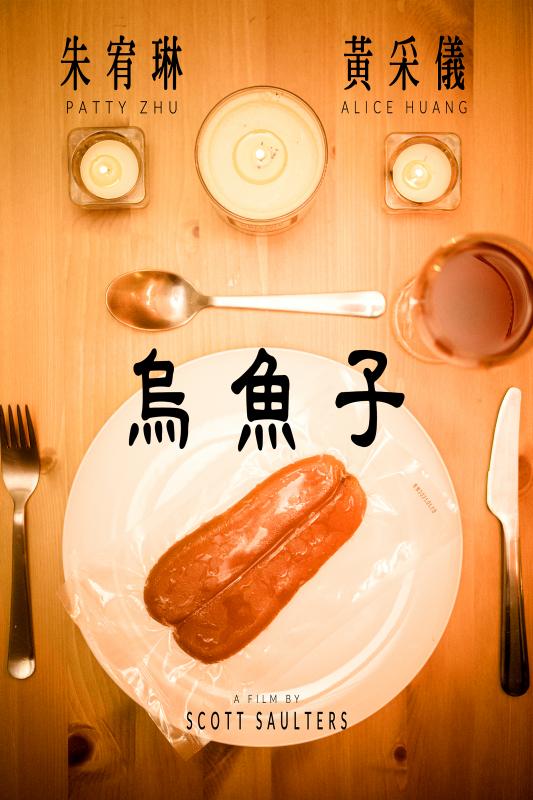Scott Saulters wasn’t sure if his film had just taken one of the two top prizes at a recent film competition.
Although Saulters has been in Taiwan for 15 years and is proficient in Mandarin, the award ceremony for the inaugural “Bi Tian Iann” (眯電影) short film contest was conducted entirely in Hoklo (also known as Taiwanese), a language he can’t speak.
“I thought I heard it, but I didn’t want to look too excited,” he says.

Photo courtesy of Scott Saulters
Despite his limited command of the tongue, Saulter’s entry, Wu Yu Tzu (烏魚子, mullet roe), took first place in the amateur category of the competition, which called for three-minute submissions with at least 80 percent of the dialogue in Hoklo.
The contest was organized by PTS Taigi — the PTS’ Hoklo-language channel launched in July last year, along with the Taipei Film Commission and the Taipei Culture Foundation.
“I wasn’t really too concerned about making a film in a language I cannot speak, as I can speak Mandarin, which is close enough to not make it a completely foreign experience,” Saulters says.

Photos courtesy of Scott Saulters
It helps that Saulters’ partner, Patty Zhu (朱宥琳), is a Taiwanese stage actress whose mother tongue is Hoklo. Zhu, who stars in Wu Yu Tzu, says the two began writing and shooting shorts after the COVID-19 pandemic put her out of work.
Saulters, who works for a gaming graphics company, returned from a business trip to the US right before the 14-day mandatory quarantine was imposed. Believing that they would be permanently stuck at home, the two started setting up the scenes for Wu Yu Tzu.
“The [Centers of Disease Control] told me two days later that they had made a mistake,” Saulters says. “But we had already made the plans.”
RHYTHMS OF HOKLO
They looked up film competitions and found that “Bi Tian Iann” fit the timeframe and parameters the best — except for the language. Saulters already knew the script pretty well when they switched it to Hoklo, though he still had some difficulties editing since the scenes weren’t filmed in order. As a musician, he treated the sounds as musical notes during the post-production process.
“There are a lot of nuances to the [Hoklo] language … that give it its beauty,” Saulters says. “I perceive them as music qualities, similar to rhythmic motifs, melodic inflections, variations in tempo and so on. I allow this almost unconscious information to influence and guide the visual structures.”
Zhu, who grew up in Taipei, says she feels that when Hoklo is used in a local film or drama production, it almost always features old people in the countryside, temple performers or stereotypical tropes such as gangsters or loud aunties. When her colleagues were assigned Hoklo roles, she noticed they would automatically assume exaggerated personas to cater to this stereotype.
“It’s as if the language changes their character or the settings,” she says. “The transformation happens so naturally, but it shouldn’t be this way.”
As someone who says that the language “makes her feel like home,” Zhu feels uncomfortable with this continued portrayal. The situation contrasts with the music industry, where Hoklo pop, rock and rap enjoy considerable popularity.
“Hoklo dramas generally cater to older audiences,” she says. “I wanted to portray Hoklo in a modern setting, featuring more relevant themes and dialogue.”
However, the reality is that Hoklo is not heard very often in Taipei. “The settings still need to be logical,” Zhu says. “It’s implausible to show crowds chattering in Hoklo on Zhongxiao E Road.”
The resulting film portrays a simple phone conversation between a woman and her mother. Zhu’s character is asking her mother how to prepare mullet roe for a dinner guest, but the mother is more interested in her love life. It’s one of those seemingly casual but loaded conversations between family members in Taiwan, and Zhu feels that Hoklo can better express this roundabout way of speaking.
“The language needs to be modernized in order to be preserved,” Zhu says. “Only by presenting it in new ways can we open more avenues and possibilities for its development.”

Jacques Poissant’s suffering stopped the day he asked his daughter if it would be “cowardly to ask to be helped to die.” The retired Canadian insurance adviser was 93, and “was wasting away” after a long battle with prostate cancer. “He no longer had any zest for life,” Josee Poissant said. Last year her mother made the same choice at 96 when she realized she would not be getting out of hospital. She died surrounded by her children and their partners listening to the music she loved. “She was at peace. She sang until she went to sleep.” Josee Poissant remembers it as a beautiful

March 2 to March 8 Gunfire rang out along the shore of the frontline island of Lieyu (烈嶼) on a foggy afternoon on March 7, 1987. By the time it was over, about 20 unarmed Vietnamese refugees — men, women, elderly and children — were dead. They were hastily buried, followed by decades of silence. Months later, opposition politicians and journalists tried to uncover what had happened, but conflicting accounts only deepened the confusion. One version suggested that government troops had mistakenly killed their own operatives attempting to return home from Vietnam. The military maintained that the

Before the last section of the round-the-island railway was electrified, one old blue train still chugged back and forth between Pingtung County’s Fangliao (枋寮) and Taitung (台東) stations once a day. It was so slow, was so hot (it had no air conditioning) and covered such a short distance, that the low fare still failed to attract many riders. This relic of the past was finally retired when the South Link Line was fully electrified on Dec. 23, 2020. A wave of nostalgia surrounded the termination of the Ordinary Train service, as these train carriages had been in use for decades

Lori Sepich smoked for years and sometimes skipped taking her blood pressure medicine. But she never thought she’d have a heart attack. The possibility “just wasn’t registering with me,” said the 64-year-old from Memphis, Tennessee, who suffered two of them 13 years apart. She’s far from alone. More than 60 million women in the US live with cardiovascular disease, which includes heart disease as well as stroke, heart failure and atrial fibrillation. And despite the myth that heart attacks mostly strike men, women are vulnerable too. Overall in the US, 1 in 5 women dies of cardiovascular disease each year, 37,000 of them